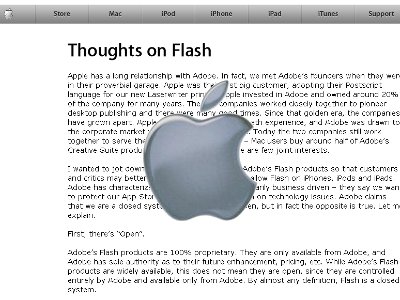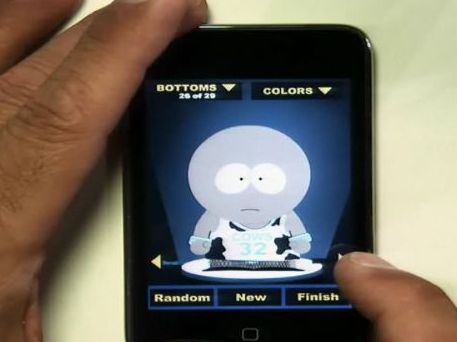Jobs launches devastating attack on Flash

Steve Jobs has penned an open letter about the problems with Flash, accusing the widespread Adobe product of being a closed system that was designed for PCs and mice and is riddled with security and efficiency issues.
He says that while the companies still work together, "there are few joint interests", and gives six reasons why the platform is not supported:
1. Flash is not open
Jobs says that while Adobe claims Flash is open to all, "this does not mean they are open, since they are controlled entirely by Adobe and available only from Adobe. By almost any definition, Flash is a closed system."
He goes on to point out that HTML5, a standard Apple is involved in directing, is a better fit for today's modern devices.
2. Flash video is the only way to access the 'full' web
Although many websites use Flash for video and web page building, Apple believes than the H.264 format is a more modern and simple format, which it uses for its YouTube app. "iPhone, iPod and iPad users aren't missing much video," claims Jobs.
Sign up for breaking news, reviews, opinion, top tech deals, and more.
3. It's not secure and it's unreliable
Jobs says that Flash was highlighted as having "one of the worst security records in 2009" and "Flash is the number one reason Macs crash". He also said that Adobe has been unable to show any mobile device that runs Flash well, and that it has constantly been pushed back as a standard release for smartphones.
4. It's a battery killer
Jobs again harps on about the power of H.264, which uses hardware decoding, rather than software to realise serious battery savings.
"The difference is striking:on an iPhone, for example,H.264 videos play for up to 10 hours, while videos decoded in software play for less than 5 hours before the battery is fully drained.
"When websites re-encode their videos using H.264, they can offer them without using Flash at all. They play perfectly in browsers like Apple's Safari and Google's Chrome without any plugins whatsoever, and look great on iPhones, iPods and iPads."

5. Flash was designed for mice and PCs, not touch
With Flash created so long ago, Apple believes it still relies on mice and such peripherals to function for elements like 'rollovers'.
"Apple's revolutionary multi-touch interface doesn't use a mouse, and there is no concept of a rollover. Most Flash websites will need to be rewritten to support touch-based devices. If developers need to rewrite their Flash websites, why not use modern technologies like HTML5,CSSand JavaScript?
"Even if iPhones, iPods and iPads ran Flash, it would not solve the problem that most Flash websites need to be rewritten to support touch-based devices."
6. Apple wants to stay in control of the App Store
A lot of people believe that Apple has denied the use of Flash on its devices because it would undermine Apple's control of the App Store – and now Jobs has admitted it, saying Adobe wants developers to use Flash to create applications.
"We know from painful experience that letting a third party layer of software come between the platform and the developer ultimately results in sub-standard apps and hinders the enhancement and progress of the platform.
"If developers grow dependent on third party development libraries and tools, they can only take advantage of platform enhancements if and when the third party chooses to adopt the new features. We cannot be at the mercy of a third party deciding if and when they will make our enhancements available to our developers."
Jobs confirms that Apple wants to keep Flash away so it can control the performance of its apps to make sure they stand up to Apple's standards, something he believes has made the App Store so successful:
"Everybody wins - we sell more devices because we have the best apps, developers reach a wider and wider audience and customer base, and users are continually delighted by the best and broadest selection of apps on any platform."
Jobs signs off with a final broadside at Adobe: "New open standards created in the mobile era, such as HTML5, will win on mobile devices (and PCs too). Perhaps Adobe should focus more on creating great HTML5 tools for the future, and less on criticizing Apple for leaving the past behind."

Gareth has been part of the consumer technology world in a career spanning three decades. He started life as a staff writer on the fledgling TechRadar, and has grew with the site (primarily as phones, tablets and wearables editor) until becoming Global Editor in Chief in 2018. Gareth has written over 4,000 articles for TechRadar, has contributed expert insight to a number of other publications, chaired panels on zeitgeist technologies, presented at the Gadget Show Live as well as representing the brand on TV and radio for multiple channels including Sky, BBC, ITV and Al-Jazeera. Passionate about fitness, he can bore anyone rigid about stress management, sleep tracking, heart rate variance as well as bemoaning something about the latest iPhone, Galaxy or OLED TV.